June 24, 2016 Ryukyu Shimpo
In a peace declaration made at the June 23 memorial to mourn those who were sacrificed in the Battle of Okinawa, Okinawa Governor Takeshi Onaga called on the Japanese and U.S. governments to reduce the U.S. Marine presence on Okinawa as a concrete measure to protect human rights and peace.
The Battle of Okinawa saw one in four Okinawans killed in a fierce land battle. After the war, Okinawan human rights continued to be severely violated due to crimes and accidents caused by U.S. military personnel and civilian employees. And in April of this year, yet another tragic incident occurred.
In Governor Onaga’s peace declaration was engraved the anguish and anger of Okinawans toward being subject to the threat of the military, an instrument of violence, for seventy-one years since the end of the war.
Japanese Prime Minister Shinzo Abe and U.S. Ambassador to Japan Caroline Kennedy, who attended the ceremony, should realize that.
Only natural to reduce Marine presence
In his peace declaration, Governor Onaga decried the unforgivable incident in which a former U.S. Marine and then-military contractor robbed a young woman of her life as “inhuman and vicious.” He urged his listeners to think, saying, “Okinawans have had to live face to face with the U.S.-Japan security arrangement and the U.S.-Japan Status of Forces Agreement,” and querying, “Are freedom, equality, human rights, and democracy as guaranteed to Japanese citizens by the Constitution of Japan really being guaranteed equally to us?”
This is the sorrow of which Okinawans have no choice but to speak at a ceremony intended to mourn the lives sacrificed in the Battle of Okinawa. This is Okinawa’s reality, and Onaga’s words are a statement of objection toward the negligence of the Japanese government, which has forced the oppression of U.S. bases on Okinawa and done nothing about the human rights violations caused by crimes and accidents.
Onaga’s peace declaration also specifically called on the Japanese and U.S. governments to drastically revise the Status of Forces Agreement and to consolidate and reduce the U.S. bases in Okinawa, including a reduction of the Marine forces, in order to achieve a true “Cornerstone of Peace.” It was the first time a governor included a call for the reduction of Marine forces in his peace declaration.
The Okinawa Prefectural Assembly has adopted a statement protesting the murder and demanding that the U.S. Marines withdraw from Okinawa. Okinawans also called for the withdrawal of the Marines at a mass rally held on June 19. It was only natural for Governor Onaga to include the same appeal in his peace declaration.
Peace declarations made in Hiroshima and Nagasaki, where atomic bombs caused tremendous suffering and loss of life, and where residents still suffer the aftereffects of the bombings, call for the abolition of nuclear weapons. It is natural for people to call for the abolition of nuclear weapons based on their experience of the atomic bomb.
Similarly, Okinawans are calling for the reduction of U.S. bases and above all the reduction of the Marines in order to protect Okinawan lives, property, and peace. This is a natural demand to make.
After the Battle of Okinawa ended, women became targets of sexual violence. Suzuyo Takazato, co-representative of Okinawa Women Act Against Military Violence, says that “even after the war ended, a new war began for women.”
As long as women are still becoming victims of sexual violence as a result of the U.S. bases, we cannot say that the war has ended. A reduction in Marine forces and a large-scale consolidation and downsizing of U.S. bases in Okinawa is essential to put an end to this war of sexual violence.
Stopgap measures are not enough
Prime Minister Shinzo Abe also spoke at the ceremony, saying he had protested directly to the U.S. president and announcing, “I feel extremely strong outrage that an utterly despicable and vicious incident occurred.” He explained that he is negotiating with the United States government to revise the handling of military contractors under the Status of Forces Agreement.
However, what Okinawans demand is a drastic revision of the Status of Forces Agreement, which gives special privileges to U.S. military personnel and civilian contractors and lays the groundwork for crimes. Revising the handling of military contractors under the agreement is nothing but a stopgap measure, and will do nothing to appease Okinawans.
Just as last year, Governor Onaga’s peace declaration harshly criticized the plan to build a new U.S. base in Henoko. “It is impossible to accept [the government’s] insistence that the relocation of Futenma Air Station to Henoko is the only solution, despite its inability to gain the assent of the Okinawan people,” Onaga said.
Okinawa Association of Bereaved Families chairman Tokumasa Miyagi also stated, “As someone who lost family members in the war, I fervently wish for the immediate relocation of Futenma Air Station, but I am also absolutely opposed to the construction of a new military base, which will lead to more wars.”
These are the voices of Okinawans who experienced the Battle of Okinawa and continue to suffer human rights violations as a result of the U.S. bases. People in mainland Japan cannot continue to cover their ears and refuse to listen. So long as we accept the continuation of the U.S.-Japan security arrangement, all Japanese people must consider April’s tragic murder incident and the new base construction issue as issues in which they are directly involved.
(English translation by T&CT and Sandi Aritza)
Go to Japanese
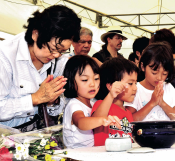
June 24, 2016 Ryukyu Shimpo
At Peace Memorial Park in Mabuni, Itoman City, where the final fight of the Battle of Okinawa took place, the Okinawa Prefectural Government and the Prefectural Assembly held the Okinawa Memorial Day Ceremony on June 23, the 71st anniversary of the end of the battle. At the ceremony, participants prayed for the 200,000 people who became victims in the battle, and vowed to create lasting peace worldwide. Prayers and requiem masses were offered at memorial services held in memorial towers throughout Okinawa.
This is the first Okinawa Memorial Day since the security legislation that allows the right to collective self-defense came into effect. This is a significant shift toward change from a Japan that had renounced war, meaning a continued concentration of U.S. base land in Okinawa and the recurrence of base-related incidents and accidents. The participants and bereaved families that attended memorial services held in the Peace Park and elsewhere demanded peace with messages such as: “I want the country to never make war again,” and “do not make Okinawa a scapegoat anymore.”
Governor Takeshi Onaga made a peace declaration at the Memorial Day Ceremony and spoke for Okinawans, saying that the rape and murder of an Okinawan woman by a U.S. base employee “greatly shocked Okinawans, who are feeling insecure and deeply resentful.” In addition, he requested that the governments of the U.S. and Japan listen to Okinawans’ strong demands for “drastic revision of the U.S.-Japan Status of Forces Agreement, reduction and realignment of U.S. military bases including a curtailment of the Marine Corps, and immediate implementation of a reduction of [Okinawa’s] overlarge share of the base burden.”
Chairman of the Okinawa Prefectural Assembly, Masaharu Kina, also highlighted the current state of Okinawa having become a scapegoat for incidents and accidents due to the presence of U.S. military bases. He did so by describing that Including the period of Government of the Ryukyu Islands’ legislative branch following the war, 511 written opinions and resolutions for Okinawans’ dignity and human rights issues related to U.S. military bases have come through the Okinawa Prefectural Assembly.
Deep resentment regarding incidents including views such as, “the limits of our patience are being exceeded” were expressed at the memorial services throughout Okinawa.
According to the organizers, 4,700 people attended the Memorial Day Ceremony. Prime Minister Shinzo Abe, Speaker of the House of Representatives Tadamori Oshima, President of the House of Councilors Masaaki Yamazaki, Minister for Foreign Affairs Fumio Kishida, Minister of Defense Gen Nakatani, U.S. Ambassador to Japan Caroline Kennedy, and other cabinet ministers and ambassadors attended. At noon, ceremony attendees offered one minute of silence.
Prime Minister Abe said that even now, more the 70 years since the end of the war and faced with the heavy reality that Okinawa bears a large base burden, Japan will tackle base burden reduction from here on out.
This year 84 new names have been engraved on the Cornerstone of Peace at Peace Memorial Park, making 241,414 engraved names to date. Bereaved families of those who were involved in the Battle of Okinawa, now reaching old age, brought offerings of food and water to those represented at the monument.
Go to Japanese
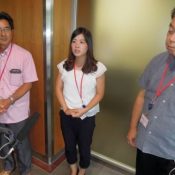
June 22, 2016 Ryukyu Shimpo
Co-representative of All Okinawa Kaigi (All Okinawa Coalition) and Meio University student Ai Tamaki, and other members, met Osamu Hayashizaki, vice-minister for policy coordination in the Cabinet Office, in Tokyo on June 22. They handed over a resolution that was adopted at the Okinawa Mass Protest Rally, which was held in the wake of the rape and murder of a woman by a U.S. military contractor.
The resolution is addressed to Prime Minister Shinzo Abe.
According to the members, the vice-minister stated that the government would make efforts to prevent any recurrence of such crimes.
The resolution demands the withdrawal of the U.S. Marine Corps from Okinawa and a
drastic revision of the Japan-U.S. Status of Forces Agreement (SOFA).
The meeting was not opened to the press.
Hiroshi Inafuku, director of the Kaigi, and Satoru Nakasone, director of the organizing
committee for the mass rally and a member of the prefectural assembly, also attended.
After the meeting, Tamaki said to reporters, “The government should think seriously about working for the prefectural people, and realize what the military is really doing.” She criticized the preventative measures put in place by the government, saying, “Preventing recurrence and enforcement of strict official discipline are hackneyed phrases. Do not make fun of us. The government suggests that it will increase the number of patrol cars, and that women need to learn the art of defense.”
The All Okinawa Kaigi submitted the resolution to Aiko Shimajiri, the minister in charge of Okinawa affairs.
They are scheduled to also convey the message of the resolution to the Foreign Ministry and Ministry of Defense.
(English translation by T&CT)
Go to Japanese
June 20, 2016 Ryukyu Shimpo
As long as there are bases in Okinawa, incidents perpetrated by the U.S. military and base employees that violate women’s human rights and put their lives in danger will continue to occur.
The anger and sadness of Okinawans can no longer be expressed in words, and has reached a tipping point. It is of great significance that Okinawans have pledged their dignity and honor to the resolution that the withdrawal of the U.S. Marine Corps from Okinawa is essential.
By resolving so, Okinawans have demonstrated their right to self-determination.
The mass rally protesting the rape and murder of a woman by a U.S. base employee opened with Misako Koja singing Warabigami. It is the song of a mother’s overflowing affectionate thoughts for her child.
In the third verse of the song the mother says she wants her child’s flowers to bloom, so she will become a windbreak. (Translator’s note: This verse means that the mother wishes to protect her child and will do anything for her child to live a full life.)
However, the community of Okinawa has not been able to become a windbreak to protect the lives of women. The visage of women wiping away tears stood out as a majority of participants looked downward, lost in the song and singing in doleful voices.
Youth have great capacity to make appeals
While the heat approached 35 degrees Celsius or 95 degrees Fahrenheit, 65,000 hastened to dress themselves in black and show their condolences. Perhaps they were driven by the thought that they cannot sit by and do nothing. Parents who took their young children by the hand and brought their whole family along also stood out in the crowd.
The room was still, and applause for speakers tended to falter. Unlike past mass rallies having to do with bases, the meeting place was full of a sorrowful, remorseful air.
Thinking fervently of the victim and the chagrin of her bereaved family, those gathered kept contained their profound rage and regret at having been unable to save her life.
Furthermore, the rally held mixed feelings of mourning for the great numbers of victims that have inevitably come since the U.S. military base pressures originated from the Battle of Okinawa 71 years ago, and the oath to prevent more people from becoming victims.
The resolution at the mass rally demonstrated Okinawans’ firm conviction to fight against the discriminative imposition of bases in Okinawa, pushing back against the governments of the U.S. and Japan.
A distinguishing feature of this mass rally is that it has emitted a remarkably strong message. That message is that young generations will shoulder the burden of Okinawa’s near future, and will realize a harmonious society where women and children will be able to live with peace of mind.
One of the delegation Ai Tamaki, 21 years old and a senior at Meio University, garbed in a mourning dress, called out Prime Minister Shinzo Abe as well as citizens living in mainland Japan. In tears, she called them “secondary perpetrators.” She complained that, “Childish proposals like preventing the recurrence of incidents and tightening discipline [among U.S. military members and base employees] carry no meaning.”
Okinawan popular will has come to make apparent its exhaustion of democratic means, unable to defend against the violence of U.S. military personnel, only to be persistently ignored as the Abe administration has finally left as-is the overlarge share of the base burden.
The Abe administration is forcing through construction of a new base at Henoko by exercising the power of the state over local autonomy. As such, Okinawans are making a desperate cry to citizens of mainland Japan who are looking on from the sidelines at Okinawans’ distress as someone else’s business. Participants at the rally were touched by the earnest appeals of speakers such as four university students of SEALDs RYUKYU.
Concordantly with the mass rally in Okinawa, gatherings opened in 69 locations across 41 prefectures on the same day. It can only be hoped that public opinion in support of Okinawa will rise as these ripples spread outward.
Grave requests of the bereaved family
“In order to prevent any more people from becoming victims, if all Okinawans come together as one in demanding the withdrawal of all bases and opposing the construction of a new base in Henoko, I think it is possible.” (These are the words of the father of the woman who died.)
The father of this beloved daughter who was snatched away delivered a message that went beyond the mass rally resolution to not only desire no new bases, but the withdrawal of all bases. I think this desire is charged with all of his sentiments and all his might.
How will the U.S. and Japanese governments that were certainly involved in the incident respond to this heartbroken request of the bereaved family? It is unpardonable that resentment and complaints that flow like blood from the people of the “island of bases” are ignored.
Perfunctory promises like improvement in implementation of the U.S.-Japan Status of Forces Agreement (SOFA) and recurrence prevention are unneeded. Instead of responding with empty words like “we will accept [input from Okinawans] with sincerity” (Minister of Foreign Affairs Fumio Kishida), Japanese officials should set up a conference on a solution for U.S. Marine withdrawal from Okinawa and revision of the SOFA.
The ruling party LDP and Komeito passed up participation in the rally. Even though the rally was not completely nonpartisan, the importance of the resolution is no different from that of other such resolutions, as many participants were unaffiliated with a political party.
Governor Takeshi Onaga stressed that “we cannot allow Okinawans to be victims,” pledging to “resolutely obstruct the new base in Henoko.” Similarly, Okinawans are shouldering the responsibility of preventing any more people from becoming victims in the near future. They want to deepen their self-awareness and change their conduct.
(English translation by T&CT and Erin Jones)
Go to Japanese
June 17,2016 Ryukyu Shimpo
With the aim of tackling child poverty in Okinawa, 105 organizations in the prefecture have launched a new organization called “Future of Children in Okinawa”, kicking it off with a conference at Okinawa Prefectural Office in Naha on June 17. The organization announced that their long term purpose is to lower the child poverty rate from the current number of 29.9 percent to 10 percent. This is the first time a target value for the poverty rate has been set up.
For its immediate goals to be accomplished by 2022, the organization suggested (1) boost Okinawan people’s earnings per person to 2710,000 yen, (2)providing job counseling to 800 single-parent families, and (3)increasing the number of children who go to colleges they want to enroll in.
(English translation by T&CT)
Go to Japanese
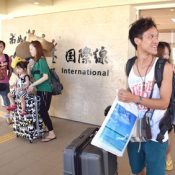
June 17, 2016 Ryukyu Shimpo
A Low-Cost Carrier based in Hong Kong, Hong Kong Express, launched its first flight service between Hong Kong and Ishigaki on June 16. A welcoming ceremony was held at the Ishigaki Airport International Terminal to celebrate the newly established service, and involved parties welcomed its first passengers. Regular flights are planned throughout year.
Direct flights will be operated twice a week during June, and it will be increased to three times a week from July. From November to March, the flights will be operated twice a week. The service is the airline’s seventh destination in Japan. It is expected to market Ishigaki as a travel destination with marine activities and beautiful nature. The first flight had almost the full capacity of 172 passengers on board. Staff from the city and a tourism promotion association handed out maps and brochures to welcome the visitors.
The general manager of Hong Kong Express, Charles Johnson, explained the motivation for the new service, saying that Ishigaki has a new airport and is an attractive place providing experiences in nature. Johnson said the company increased the service from twice to three times a week for July because of growing demand. He added that they see this route as important.
(English translation by T&CT and Sayaka Sakuma)
Go to Japanese
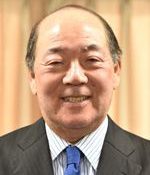
June 17, 2016 Ryukyu Shimpo
President of Orion Breweries Yoshio Kadekaru spoke out about the issue of childhood poverty, saying that he also experienced living in poverty. He went on to say he cannot allow children today to have the same experience.
Kadekaru was born in what was Yabu Village, now Nago City. He lost his father to the war when he was seven years old. After the war, his mother raised her five children as a single parent. He said that if he did not help his mother with her work, they could not put food on the table. Even as a student, he did labor such as mowing lawns for foreign residents to support his family. After graduating Naha Commercial High School, he got a job at Daiichi Mutual Savings Bank, the predecessor to Okinawa Kaiho Bank. He said at school he “could not go on field trips, or even purchase a school uniform.” Looking back, he remembered borrowing a school uniform for his interview at the bank.
In commemoration of its 30th anniversary, Orion Breweries ordered tropical plants including golden shower trees from places such as Hawaii and South America, and distributed them throughout Okinawa free of charge. These were used in conjunction with a cultural exchange effort to provide the viewing of tropical plants for Okinawans and visitors alike.
Orion Breweries’ company statutes stipulate that part of its profits can be used to benefit the community. Company founder Sosei Gushiken’s vision of “an Okinawa where youth can play an active role in society” puts emphasis on this statute.
(English translation by T&CT and Erin Jones)
Go to Japanese
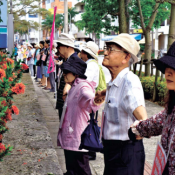
June 14, 2016 Ryukyu Shimpo
On June 13, a residents’ group dedicated to preventing the deployment of Japan Self-Defense Force (SDF) troops on Ishigaki Island surrounded Ishigaki City Hall to protest the plan. The Ishigaki city council is in the middle of its June regular session, and people are anxious to see how it will respond to appeals both in favor of and opposed to the plan. Around 200 people joined the protest to demand cautions deliberation and oppose the plan.
The city council’s general committee on public finances has received both a petition favoring the deployment of troops, and a petition newly submitted by Takada Ward, near the potential deployment site, calling for cancellation of the deployment plan. The committee will decide during its June session how to respond to the petitions. However, during the committee session held in March, the ruling party majority in the committee opposed continued deliberation of a petition submitted by the above-mentioned residents’ group, and it was not adopted.
At the organizers’ signal, protesters surrounding City Hall joined hands twice and called on Mayor Yoshitaka Nakayama and the city council not to accept the SDF deployment. “We have to stop the movement toward promoting the plan at the June city council session,” said Hidemasa Uehara, co-representative of the residents’ group.
(English translation by T&CT and Sandi Aritza)
Go to Japanese

June 17, 2016 Ryukyu Shimpo
On June 16, the Okinawa Meteorological Observatory announced the rainy season had ended in Okinawa. The rainy season usually ends around June 23. This year it ended one week earlier than usual and earlier than last year, when the rainy season ended on June 8. This year’s rainy season started in Okinawa on May 16, seven days later than usual. The season lasted for 31 days.
According to the observatory, it rained heavily this season. At five out of eight observation points, precipitation exceeded the normal value.
On June 16 in Okinawa where it was sunny due to the Pacific anticyclone, 25 out of 28 temperature observation points recorded a hot day. In Naha City, the temperature was its highest this year at 31.8 degrees Celsius. It will bring clear skies to Okinawa for a week.
(English translation by T&CT and Megumi Chibana)
Go to Japanese
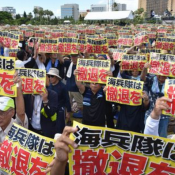
June 19, 2016 Ryukyu Shimpo Digital Edition
At 2 p.m. on June 19 at Naha’s Ounoyama Athletic Park, a rally was held to protest in the wake of the rape and murder of a woman by a U.S. military contractor. The official title of the rally was, “Denounce the cruel act of brutality by a former Marine! Mass rally to mourn the victim and demand the withdrawal of all Marines from Okinawa.” It was organized by the All Okinawa Coalition to Prevent the Construction of a New Base at Henoko. According to the organizers, 65,000 participants attended the rally.
The victim’s father expressed his gratitude in a written message to the participants. “In order to prevent any more people from becoming victims, if all Okinawans come together as one in demanding the withdrawal of all the bases and opposing the construction of a new base in Henoko, I think it is possible. As a person of Okinawa, this is my fervent wish,” he said. “In order to prevent any more people from becoming victims, if all Okinawans come together as one in demanding the withdrawal of all the bases and opposing the construction of a new base in Henoko, I think it is possible. As a person of Okinawa, this is my fervent wish,” he said.
Governor Takeshi Onaga also spoke, referring to the 1995 rape of a young girl by three U.S. soldiers. “After the incident, we held a mass rally where we vowed never to let the same sort of thing happen again, but we were unable to change the political structure,” he said. “As a politician and as governor, I am deeply regretful of that. I am so sorry,” he added, apologizing to the people.
Governor Onaga also said that Okinawa is facing a huge wall in its attempt to see drastic revisions to the Status of Forces Agreement and prevent the construction of a new base in Henoko. However, he said, “We must bring our hearts together as one and break down this wall with a strong will and with pride. Today is a day of decision. Let’s give it our all.”
A resolution was adopted at the rally that states that anger and sadness of Okinawans toward continuous crimes and accidents involving people affiliated with the U.S. military has surpassed a tipping point. It protests that repeated promises from the Japanese and U.S. governments each time an incident occurs to enforce strict discipline and prevent recurrences ring hollow, and that to protect the human rights of Okinawans, a large-scale reduction of U.S. bases in Okinawa, and in particular the withdrawal of the U.S. Marines, is of the essence.
The resolution also demanded: (1) An apology and full compensation to the victim’s family and to the Okinawan people; (2) the closure and removal of U.S. Marine Corps Air Station Futenma, not conditioned on its relocation within Okinawa; and (3) drastic revision of the Status of Forces Agreement.
(English translation by T&CT and Sandi Aritza)
Go to Japanese







 Webcam(Kokusai Street)
Webcam(Kokusai Street)


